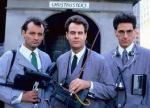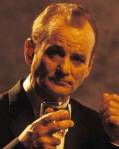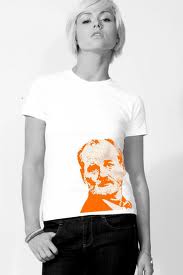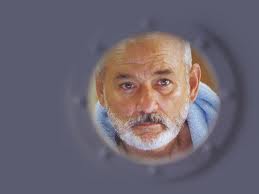“A man has as many social selves as there are individuals who recognize him.” – William James
The charisma of Bill Murray lies primarily in his elusiveness. Sure, he’s hilarious, and he has starred in some of the most iconic comedic films of the last thirty years. But he also seems like a regular guy, and this discrepancy between his genius and his common-man appeal, his two social selves, is what separates him from other comic legends to whom we might reasonably compare him. Consider his lore.
In 1976, he joined the cast of “Saturday Night Live,” replacing Chevy Chase, who was widely villified for leaving the show after one season. When Chevy came back to host the show the following year, Murray started a fistfight with him. In the 1980s and early 1990s, he starred in several iconic comedies, including “Caddyshack, “Stripes,” “Ghostbusters,” and “Groundhog Day.” He disappeared for a couple of years, only to reinvent himself with 1998’s “Rushmore,” in which he displayed new depths of emotion. For the next fifteen years, he continued to mine for credibility. He has been nominated for several Golden Globes (he won once) and one Oscar. More notably, he continued to build his myth off-screen. In 2007, he was arrested for driving a golf cart through the streets of Stockholm and refusing to submit to a Breathalyzer test. In 2008, he was sighted partying with the band MGMT at several house parties in Williamsburg, Brooklyn. And last year, he was reported to have joined a random group of strangers for a night of karaoke. And yes, there were pictures to prove it.
Bill Murray has caught on with the young, hipster generation for two reasons. One, he has been a mainstay in Wes Anderson’s movies, which are popular among that crowd. But he is also a fixture of the 1980s, a decade whose fashion and style are popular again. Murray’s smug detachment is a key element of his persona, and it is manna from heaven to a generation that grew up in the age of irony. This is why they wear shirts with his face on them.
So it is probably a fool’s errand to try to play detective and figure out who Bill Murray really is. But he gave us a pretty big clue as to his politics two months ago when he appeared on CNBC’s “Squawk Box,” a political show. He was careful to criticize both parties for bickering, but when asked to distill his political philosophy, he said the following:
I think we ought to be personally responsible…I think we’ve sort of gotten used to someone looking out for us, and I don’t think any other person is necessarily going to be counted on to look out for us…I think there’s only so many people that can take care of themselves, and can take care of other people. And the rest of the people, they’re useful in terms of compost for the whole planet, you know.
And with that, all the liberal hipsters started crying in their Pabst Blue Ribbons. How could this man, so revered by the Obama generation, take such a conservative position? Was this the real Bill Murray talking or was he just joking? Was there a slight grin on his face as he uttered those words? These are the questions we ask when faced with an elusive man. While Murray may never betray his real self to the public, a close examination of his films reveals that he may in fact lean conservative, although, true to enigmatic form, he has made several movies that espouse liberal values. Let’s take a look.
Released less than six months after Reagan took office, “Stripes” features Murray and frequent collaborator Harold Ramis as a couple of slackers who join the Army on a whim. In interviews, Ramis has noted that he was surprised with the Army’s cooperation during the making of the film – which included permission to use Fort Knox for the basic training sequences. But the Army’s motivation is pretty clear: “Stripes” is effectively a 90-minute recruiting video, in which a man-child with no motivation and no prospects joins the Army and becomes a man. Halfway through the film, Murray gives a rousing, iconic speech – in fact, it could be argued that it was in this moment that Murray became a star – in which he makes the case for enlistment:
When Reagan took office, the U.S. military was plagued with problems: low morale, old equipment, low pay, and an exodus of talent to the private sector. A drastic increase in defense spending was a key element in Reagan’s first-term plan. In fact, by the time Reagan’s presidency ended, he had managed a 43% increase in defense spending over the total expenditures during the height of the Vietnam War. Along with “First Blood,” “Stripes” came along to reframe the U.S. military for a new generation just when Reagan was seeking to justify these massive new military budgets, which are still with us today. Intentional or not, “Stripes” was a boon to the conservative agenda of the 1980s.
 The conservative messages embedded in the plot of “Ghostbusters,” Murray’s next hit, have been covered in more detail previously on this blog, but I will provide a quick run-down here. Murray’s Peter Venkman leads a team of private-sector entrepreneurs who are fighting a new urban crime epidemic. Where the public sector finds itself ill-equipped to handle the problem, the Ghostbusters succeed. While the focus on private-sector solutions and vilification of the EPA (Walter Peck, the movie’s heavy, is a sniveling regulator from that much-maligned agency) is certainly in line with conservative ‘80s dogma, one can even find a parallel between the Ghostbusters and Nancy Reagan’s “Just Say No” initiative, an attempt to stop a new, urban epidemic (crack use) with personal responsibility and private sector solutions instead of government intervention.
The conservative messages embedded in the plot of “Ghostbusters,” Murray’s next hit, have been covered in more detail previously on this blog, but I will provide a quick run-down here. Murray’s Peter Venkman leads a team of private-sector entrepreneurs who are fighting a new urban crime epidemic. Where the public sector finds itself ill-equipped to handle the problem, the Ghostbusters succeed. While the focus on private-sector solutions and vilification of the EPA (Walter Peck, the movie’s heavy, is a sniveling regulator from that much-maligned agency) is certainly in line with conservative ‘80s dogma, one can even find a parallel between the Ghostbusters and Nancy Reagan’s “Just Say No” initiative, an attempt to stop a new, urban epidemic (crack use) with personal responsibility and private sector solutions instead of government intervention.
In the four years after “Ghostbusters,” Murray took a break from the public eye. His 1985 drama “The Razor’s Edge” was a flop, and he had a small part in 1986’s “Little Shop of Horrors.” That was it. But he returned in a big way with 1988’s “Scrooged,” released just in time for the Christmas season. “Scrooged,” which had huge expectations but managed only a small profit, is based on the classic Dickens tale, “A Christmas Carol,” oft-vilified by the right for its criticism of pure capitalism. Murray plays Frank Cross, a greedy, unfeeling television network CEO who, over the course of one Christmas Eve, is visited by three ghosts and learns the true meaning of…well, you know the rest. Cross is what the Republican party would now call a job-creator, but “Scrooged” posits that his lust for money and power is really just misdirected longing for a lost love. In this way, “Scrooged” marks a liberal diversion from his previous run of conservative-tinged hits.
If there is one comedy from the last 25 years that needs no plot summary, it is “Groundhog Day.” Everyone knows and likes this movie. It has been hailed by a variety of religious groups as a representation of their faith’s key tenets. It is taught in philosophy classes in universities around the country. It seems to be a largely apolitical film, but that has not stopped the conservative National Review from claiming it as their own. Jonah Goldberg wrote of it:
For the conservative, the moral of the tale is that redemption and meaning are derived not from indulging your “authentic” instincts and drives, but from striving to live up to external and timeless ideals. Murray begins the film as an irony-soaked narcissist, contemptuous of beauty, art, and commitment. His journey of self-discovery leads him to understand that the fads of modernity are no substitute for the permanent things.
I think this is a bit of a stretch. “Groundhog Day” is the kind of classic film that people of all political persuasions can see themselves in. Goldberg is correct that “Groundhog Day” is a comment on a culture that promotes narcissism, but it cannot be tied to conservative principles. The film does promote love and relationships over casual sex, a value claimed by conservatives in recent years, but it also promotes altruism, a concept that is anathema to the party that associates itself with Ayn Rand. “Groundhog Day” has achieved its iconic status because it reflects our dissatisfaction with our societal system of rewards, but it is not a political film.
After “Groundhog Day,” Murray must have felt he had reached his comedic peak as a leading man because he began to seek out supporting roles and more dramatic films. In the next five years, he starred in flops like “Larger than Life” and “The Man Who Knew Too Little” (which was criminally underrated), but he shined in supporting roles in “Mad Dog and Glory,” “Ed Wood,” and “Kingpin.” It was not until 1998, however, that Murray found what he was looking for, a role in which he could reinvent himself. Starting with “Rushmore,” he has impressed critics and audiences alike in more dramatic roles. He is still funny, but the humor has underpinnings of real human drama.
As Herman Blume in “Rushmore,” Murray provides a nuanced portrait of a disillusioned capitalist. Blume runs a successful steel company, has a big house and a nice car, but his life is a mess. His wife is cheating on him, he hates his children, and he has lost the vitality of his youth. In this scene, Murray embodies a man who has everything…and nothing:
Blume is the kind of job-creator that Republicans would currently be holding up as an example of capitalism gone right, but while Blume has built himself up into a success, he has never achieved any sustained emotional growth. In this way, the film devalues professional success and emphasizes emotional growth. Hardly the conservative way.
Several of Murray’s roles since then have featured similar characters. His performance in “Lost in Translation” received such acclaim probably because it was seen as the most self-reflective; audiences saw the character, an aging movie star, as a thinly disguised version of Murray. Like Herman Blume, Murray’s Bob Harris got everything that he was brought up to want: fame, money, and a family. But none of it makes him happy. The same is true of his Don Johnston in “Broken Flowers,” although the socio-political twist in “Flowers” is that Don is wealthy but a perpetual bachelor. He has never known the rewards of a strong marriage, or even a long-lasting relationship, so his journey, in which he visits four ex-girlfriends to try to discover who wrote him the anonymous letter in which he was told that he has a son, is a journey towards family values and away from the cheap and fleeting rewards of the sexual revolution. “Broken Flowers” could conceivably fit within a conservative mindset.
Like Herman Blume, Murray’s Bob Harris got everything that he was brought up to want: fame, money, and a family. But none of it makes him happy. The same is true of his Don Johnston in “Broken Flowers,” although the socio-political twist in “Flowers” is that Don is wealthy but a perpetual bachelor. He has never known the rewards of a strong marriage, or even a long-lasting relationship, so his journey, in which he visits four ex-girlfriends to try to discover who wrote him the anonymous letter in which he was told that he has a son, is a journey towards family values and away from the cheap and fleeting rewards of the sexual revolution. “Broken Flowers” could conceivably fit within a conservative mindset.
So we can only conclude that the Murray 2.0 that we first met in “Rushmore” is not easily identifiable by his politics. But it is clear that he has come to specialize in a very specific type of role that he can play better than pretty much anyone: an emotionally-detached rich asshole. I shudder to think that the reason Murray has come to specialize in these roles is because he in fact is an emotionally-detached rich asshole, although that is exactly what he sounded like in that CNBC interview.
His late-career canon of jerks, however, does not fall neatly upon political lines. In other words, there are rich assholes on both sides of the aisle. It is true that Republican economic policies clearly favor the wealthy and that most of the characters Murray has played of late would probably vote Romney this November, but he does not play them with a political slant. He no longer goes for cheap laughs, and he never ridicules them. He also does not make them overly likeable as to forgive them for their sins. He does not judge them at all, in fact. What he does is humanize them, and when we do laugh, we laugh with him.
And so William James Murray remains an enigma, a different social self to all who view him. King of the hipsters. Conservative folk hero. Karaoke guru. Rich asshole. But whoever he is, his movies rarely disappoint. As long as he keeps making them, we won’t ask for anything more.





GQ: So what the hell do you watch, then? Sports?
Bill Murray: I watch sports, I watch movies, Current TV on the satellite—I kind of like that. Honestly, I’m just easily bored. C-SPAN can be really great. Like the night Obama won the election, C-SPAN was the greatest. There were no announcers, just Chicago. It was just that crowd in Grant Park, and it was just fuckin’ jazz. You know, it was just wow. And that’s my town, you know? It was just: “Oh, my God, it’s gonna happen! [getting genuinely excited] It’s gonna happen!” You just saw the pictures of it, like, oh, there’s someone from the Northwest Side, there’s someone from the South Side, someone from the suburbs. It was the most truly American thing you’ve ever seen. [pause] Oh God, I get jazzed just thinkin’ about it. I don’t know anyone that wasn’t crying. It was just: Thank God this long national nightmare is over.
Read More http://www.gq.com/entertainment/celebrities/201008/bill-murray-dan-fierman-gq-interview#ixzz1tkNLLJtg
If Bill Murray is a political conservative it can only prove that there really is a god. Liberals are fucking pukes. Brainless head bobbing sycophants with their heads up their asses who cannot see what a pelosi or an obama really are. Obama is a complete MORON. A smart one for sure, but a moron. Give me a fucking break. GO BILL MURRAY… come out of the closet and finally call liberals out for what they really are. Freedom hating, Tax loving, Pollyanna morons that want to force their brand of morality on everyone else using the other sides money. FUCK THEM and fuck the authoer of this article, unless you happen to be a conservatives then cheers. I didnt really read the whole thing, just bills quote from squawk box.
What about City of Ember? anti-communist/ anti-government corruption film with a few barbs toward secularism(“Singing Day”) and the “we’re all in this together so it’ll have to be ok” pollyannish mentality
Thanks for the comment. I haven’t seen it, but it sounds interesting. I’ll give it a look. Thanks for the recommendation.
Pingback: Stop the presses: Hollywood actor calls on Americans to be ‘personally responsible’ | FavStocks
“…devalues professional success and emphasizes emotional growth. Hardly the conservative way…” You have a strange view of conservatism. I think you’re confusing capitalism and conservatism, the former of which is an economic system and the latter of which is a political philosophy. Also, you state that altruism is “anathema” to conservatives. One of the bases of conservatism is that charity shouldn’t be legislated from a central government, but instead grow from an individual’s desire. Conservatives are typically quite generous in giving time and money, many of whom do so from a faith-based standpoint. (And I’m not saying that liberals are not generous in such ways.) Conservatives believe that capitalism is the best system by which people can pursue their economic life goals.
You certainly have hit the reader over the head with quite the stereotype, which ironically, was one reason you disliked the film Promised Land.
Regardless, I love Bill Murray, too. And I don’t care to know his politics.
My guess is that Murray is not a conservative, but a libertarian, of which there is a HUGE difference. You can’t say that you believe in small government and then turn around curb free speech, advocate military expansionism, and try to tell people what to do with their bodies and property, or who to love. But seriously, let’s face it: on a scale from zero to totalitarian, both conservatives and “liberals” http://en.wikipedia.org/wiki/Classical_liberalism
both fall somewhere between a 6 and an 8.